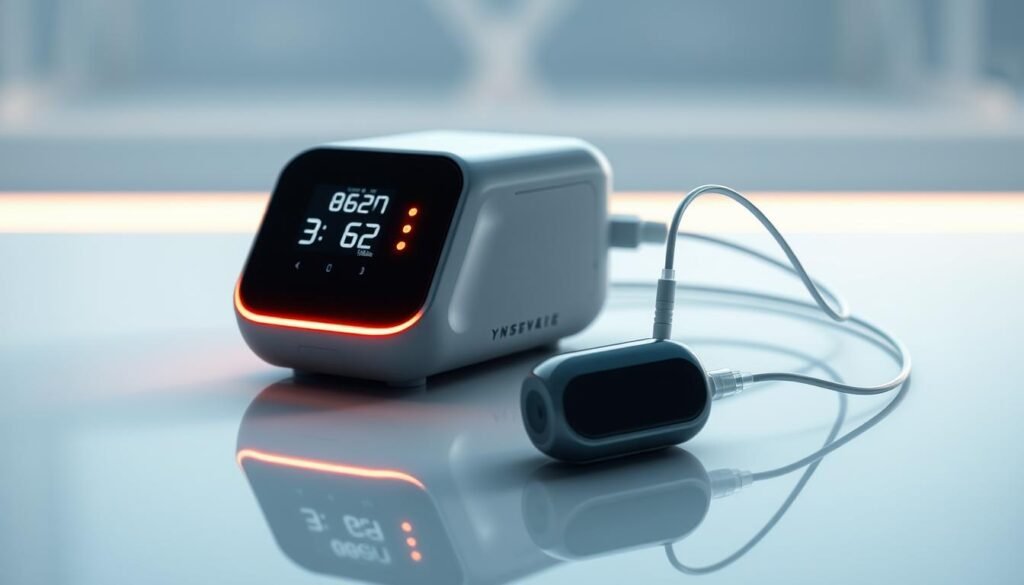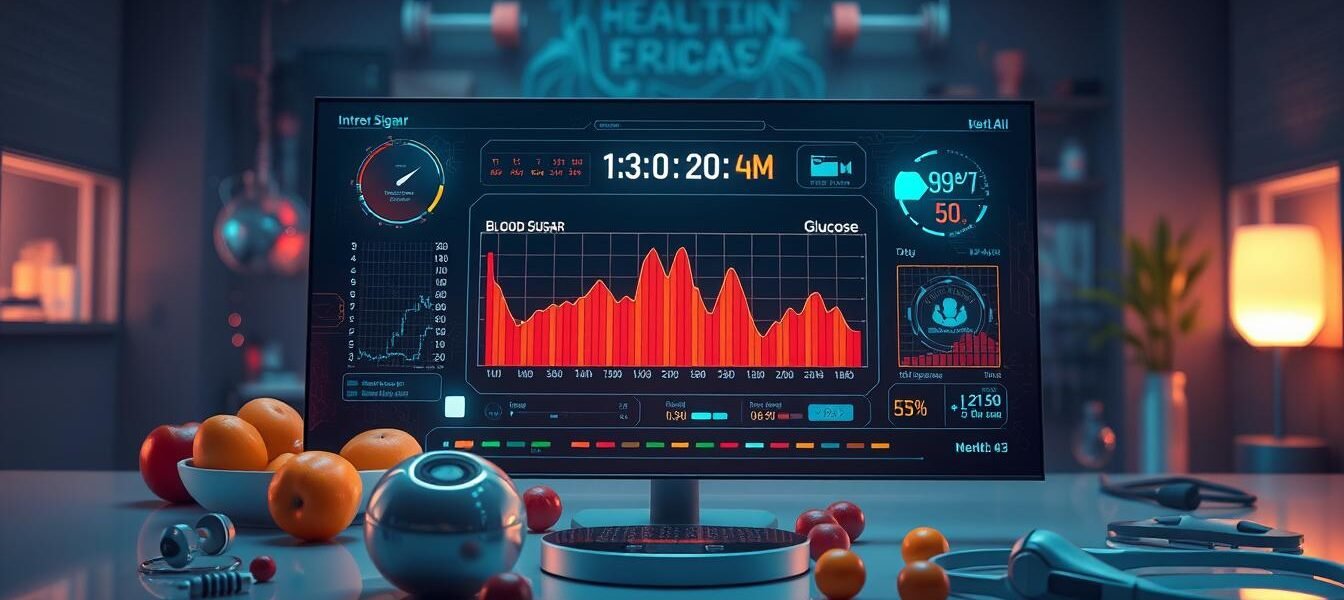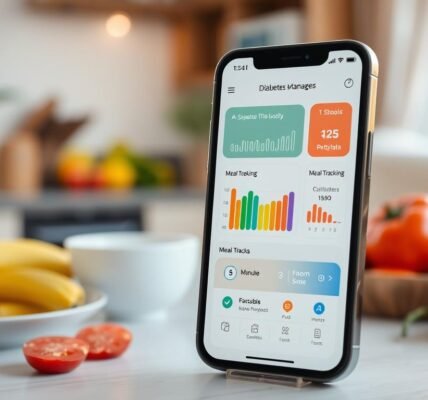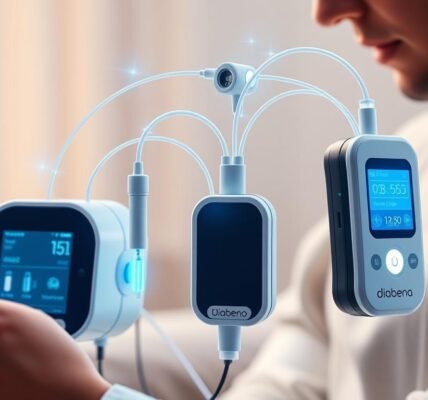“The best way to predict the future is to create it.” – Peter Drucker. This saying is very true in healthcare. It shows how new technologies can help us create a healthier future. With more people getting diabetes, we need new ways to manage it.
Artificial Intelligence (AI) is a big help in this area. It offers tools for tracking blood sugar and predicting glucose levels. This means doctors can give care that fits each patient’s needs better. It also helps find people at risk of diabetes early, so they can get help sooner1.
The International Diabetes Federation says diabetes will rise by 46% by 2045. So, using AI to manage blood sugar is very important2. This is where your journey to learn about AI’s role in blood sugar starts. It promises a future where managing diabetes is easier and more personal.
Key Takeaways
- AI technologies are revolutionizing diabetes management.
- Around 463 million individuals globally suffer from diabetes.
- Machine learning enhances the accuracy of blood sugar predictions.
- Early detection of prediabetes allows for timely intervention.
- Innovative tools can provide tailored healthcare solutions.
The Growing Challenge of Diabetes
Diabetes is becoming a big health problem worldwide, affecting millions. It’s important to understand this complex condition to stay healthy and manage risks.
Understanding Diabetes and Its Impact
Diabetes is a metabolic disorder that affects how your body handles blood sugar (glucose). High blood sugar can cause serious health issues like heart disease, kidney failure, and nerve damage. The rising number of diabetes cases highlights the need for good management strategies.
Learning about diabetes can help you make better health choices. This knowledge can improve your health outcomes.
Statistics on Diabetes Prevalence Worldwide
Diabetes affects about 10% of the world’s population, costing nearly 1 trillion USD in healthcare3. This number is expected to grow, with predictions of over 1.3 billion adults with diabetes by 20504. Lifestyle changes, urbanization, and diet shifts are making Type 2 diabetes more common.
These trends are especially true for people from South Asian, Black African, and African Caribbean backgrounds. Knowing these statistics helps you understand the challenge and take proactive steps to manage it.
Importance of Blood Sugar Monitoring
Effective blood sugar monitoring is key for managing diabetes and avoiding serious health issues. High glucose levels can cause problems like hyperglycemia or long-term issues like neuropathy and retinopathy. Knowing these risks shows why regular checks are so important.
Consequences of Uncontrolled Blood Glucose Levels
High blood sugar levels can lead to serious health problems. These include heart disease, kidney failure, and vision issues. Using automated blood glucose tracking can greatly reduce these risks. By recognizing these dangers and managing your levels well, you can avoid many complications.
Current Methods of Blood Sugar Measurement
New methods like Continuous Glucose Monitors (CGMs) offer real-time data. While finger-prick tests are still used, they might not be as convenient. CGMs let you track your levels continuously and get alerts, helping you make better health choices. They use AI to track more accurately, improving health outcomes5.
New AI-driven devices also use your personal data to better track blood sugar levels6. Regular use of these technologies can help manage diabetes better and lower the risk of severe problems7.

AI for Blood Sugar Levels
Artificial intelligence is changing healthcare, especially for diabetes. It uses new technologies to help doctors improve patient care. AI in blood sugar monitoring creates personalized solutions for each patient.
Defining AI and Its Applications in Healthcare
Artificial intelligence makes machines think like humans. In AI in healthcare, it helps with disease diagnosis and treatment planning. AI for blood sugar management quickly analyzes large data sets, offering insights doctors didn’t have before.
How AI Technologies Enhance Blood Sugar Monitoring
AI-powered glucose monitoring is changing diabetes care. These systems monitor blood sugar continuously and analyze data in real-time. They spot patterns and predict trends, helping doctors adjust treatment plans more accurately.
AI also makes patient care more comfortable. For example, automated insulin pumps adjust insulin doses automatically. This reduces the risk of too little or too much insulin8. AI, closed-loop control, and real-time monitoring are changing how we understand glucose and insulin8.
Advanced solutions are needed because diabetes is a growing problem. In 2019, 463 million adults had diabetes worldwide. This number is expected to reach 700 million by 20458. With up to 82 percent of Alzheimer’s patients also having type 2 diabetes, the need for innovation is urgent9.
AI for blood sugar is about more than just being efficient. It’s about creating a healthcare system that focuses on patient well-being. AI monitoring systems are accurate, with a 90% accuracy rate compared to traditional methods9. AI can help manage complications from diabetes, improving patient health overall.
| Innovation | Description | Impact on Diabetes Management |
|---|---|---|
| AI-Powered Glucose Monitoring | Continuous monitoring systems analyzing real-time data | Enhances accuracy in blood sugar level management |
| Automated Insulin Pumps | Devices that provide ongoing insulin delivery and regulation | Reduces the risk of hypoglycemia and hyperglycemia |
| Dynamic Treatment Adjustments | Automatic changes in treatment based on data analysis | Improves individual management of diabetes risks |
This technological progress is set to greatly improve diabetes care. It opens the door to better management strategies and better patient experiences8.
The Role of Machine Learning in Diabetes Management
Machine learning is changing how we manage diabetes. It helps analyze big data to improve patient care. This includes collecting and engineering data to better predict blood sugar levels.
These methods spot patterns in blood sugar and create personalized care plans. This makes managing diabetes more effective for each person.
Data Collection and Feature Engineering for Machine Learning
Getting the right data is key for machine learning in diabetes. It uses info like past blood sugar levels, meds, and lifestyle. This data helps create detailed models for care.
Healthcare teams use special techniques to highlight the most important data points. This makes the models more accurate and useful.
How Machine Learning Affects Predictive Analytics
Machine learning boosts predictive analytics in diabetes care. It predicts blood sugar changes. This lets doctors make quick adjustments based on current data.
The International Diabetes Federation says we’ll see more use of these tools. The number of adults with diabetes is expected to grow a lot10. Good algorithms send alerts for high or low blood sugar, helping patients stay safe7.
With predictive analytics, diabetes care is becoming more proactive. This means better management and care for those with diabetes.

Digital Health Solutions in Diabetes Management
In recent years, digital health technologies have changed how we manage diabetes. They offer new ways to track and support those with this chronic condition. These include mobile apps and telehealth solutions, helping both doctors and patients manage blood sugar levels better.
Overview of Digital Health Technologies
Digital health solutions for diabetes offer many tools for remote monitoring and personalized care. In 2018, about 34.2 million people in the United States had diabetes, making up 10.5% of the population11. The cost of diabetes was around $327 billion a year, a 25% increase from 2012 to 201711.
Telehealth has been key in fighting this epidemic, with a big jump in virtual visits from 2019 to 202011. This is important, given the growing need for endocrinologists that is expected to get worse11.
AI-Driven Health Apps for Glucose Tracking
AI-driven digital health is a big help in managing diabetes. There are over 100,000 health apps available, many using AI to analyze glucose data. These apps give personalized advice based on this data11.
Companies like Sanofi focus on personalized care in diabetes, working with innovators like Evidation and Dario12. These apps use AI to learn from many users, offering tailored advice for better glucose tracking. This is crucial, as millions worldwide struggle with uncontrolled high blood sugar levels12.
Automated Insulin Dosing Systems
Automated insulin dosing systems are changing how we manage diabetes. They use real-time data from glucose monitors to give the right amount of insulin. This helps people with diabetes, who make up over 11% of Americans, by making dosing easier.
Systems like the iLet Bionic Pancreas adjust insulin based on each person’s needs. It makes managing insulin simpler and keeps blood sugar levels stable. Automated insulin dosing systems are for those over six with type 1 diabetes, affecting about 1.45 million Americans.
How Automation is Transforming Insulin Delivery
Automation is a big step forward in insulin delivery. It uses smart algorithms to figure out the right insulin doses. The iLet Dosing Decision Software, for example, calculates doses based on glucose monitor data.
The FDA has approved the iLet ACE Pump and its software. This opens up new ways to manage diabetes better. It helps prevent high blood sugar and makes monitoring easier for those with type 1 diabetes1314.
The Feedback Loop in Closed-Loop Insulin Delivery Systems
Closed-loop insulin systems have a smart feedback loop. They adjust insulin based on glucose levels in real-time. Studies show that AI apps can help keep blood sugar levels in check14.
These systems are getting better and could soon be used by more people with type 1 diabetes. 
| Automation Aspect | Traditional Methods | Automated Insulin Dosing Systems |
|---|---|---|
| Insulin Delivery Adjustment | Manual calculations based on set schedules | Real-time adjustments based on continuous glucose data |
| Monitoring Frequency | Multiple daily finger pricks | Continuous glucose monitoring with minimal intervention |
| Patient Engagement | Active involvement in dosing decisions | Reduced manual effort with autonomous dosing |
| Outcome Expectations | Varied glycemic control | Consistently improved control with adaptive algorithms |
As technology improves, more people with type 1 diabetes may use these systems. This could give them better control and management of their condition1314.
Smart Technology and Diabetes Management
Smart technology has made managing diabetes easier. It offers solutions for those who need ongoing care. Continuous glucose monitoring devices are key, letting patients check their sugar levels in real time. This helps with insulin doses, diet, and exercise.
Wearable Technology for Continuous Monitoring
Wearable tech for diabetes has changed how we track our health. Devices like the BeatO monitor let users check blood sugar without pricking their fingers. This makes tracking easier and more comfortable. It shows how smart devices are now part of daily diabetes care.
Companies like InPen use real-time data to help with insulin shots. This makes taking medication easier and more effective.
Advancements in Smart Glucose Monitoring Devices
New glucose monitoring tech offers alerts and data sharing. These devices give vital info on blood sugar and help doctors stay in touch. Artificial intelligence helps by analyzing data to tailor treatments.
The field of diabetes care is growing, with advanced tools like artificial pancreas systems. These systems use data from continuous monitors for better sugar control. Such innovations in glucose monitoring are key to better diabetes care1516.
| Device | Type | Features |
|---|---|---|
| BeatO | Continuous Glucose Monitor | Real-time tracking, no finger pricks |
| InPen | Smart Insulin Pen | Automated dosing assistance |
| Glytec | Insulin Management Software | Optimized insulin dosing |
| Digital Diagnostics | AI-based Analysis | Retinal image analysis for detection |
| Glyconics | Diagnostic Tool | Fingernail biomarker detection |
These advancements show how smart tech can improve diabetes care. They help you make better health choices and manage your diabetes better1516.
AI Algorithms for Monitoring Glucose Levels
AI algorithms are changing how we manage diabetes. They use complex functions to analyze big data, helping predict blood glucose levels better. Knowing about these algorithms helps us see how they help patients.
Types of AI Algorithms Used in Glucose Prediction
Many AI algorithms can predict glucose levels well. Neural networks and decision trees are key examples. They find patterns in data from glucose monitors and health records.
They can predict when glucose levels might spike, helping manage diabetes better. Researchers at Stanford University made an *AI algorithm* that can spot type 1 diabetes with 85% accuracy from health records17.
Success Stories from AI Integration in Clinical Settings
AI in diabetes care has shown great promise. A study used AI to predict glucose levels for different times18. This integration has improved patient health outcomes.
More continuous glucose monitors and AI algorithms are expected to be used soon18. AI in systems like the artificial pancreas can give insulin automatically based on glucose levels17.

| AI Algorithm Type | Key Features | Impact on Diabetes Management |
|---|---|---|
| Neural Networks | Analyzes large datasets to find complex patterns | Predicts glucose fluctuations effectively |
| Decision Trees | Uses a tree-like model for decisions based on conditions | Aids in risk assessment and management |
| Support Vector Machines | Classifies data points to predict outcomes accurately | Improves accuracy in glucose predictions |
Challenges in Implementing AI Solutions
Using AI in diabetes care faces big challenges, especially with data privacy and security. Diabetes affects 10% of the world’s people, making it crucial to keep patient data safe3. To manage diabetes well, we need to follow strict rules like HIPAA to protect health information. This shows how key data privacy in diabetes management is.
Data Privacy and Security Concerns
Adding AI to healthcare raises big worries about keeping patient data safe. With more diabetes care depending on data, the risk of data breaches is high. This could stop both patients and doctors from using these new tools. As AI grows, healthcare must focus on keeping data safe from cyber threats.
The Need for Robust Clinical Trials
AI solutions need solid clinical trials to prove they work. There’s been a lot of research in AI for healthcare, but more funding is needed15. Strong clinical trials are key to show AI is safe and works well. As technology gets better, we must test these tools in real-world settings to meet healthcare’s needs.
The Future of AI in Diabetes Care
The future of AI in diabetes care is looking bright. With new tech and learning methods, we’re seeing big changes. The trends in diabetes management are moving towards more automation and smart systems. These systems aim to give each patient a care plan that fits them best, making care more effective and personal.

Future Trends in AI and Machine Learning for Diabetes Management
AI and machine learning are changing how we manage diabetes. AI can look at lots of patient data and give insights for better care. For example, the IDx-DR device uses AI for eye scans, helping catch problems early19.
Wearable tech is also becoming more common. It lets us track blood sugar levels in real time. This helps doctors act fast when needed.
Potential for Personalized Diabetes Treatment Strategies
AI is making personalized diabetes care a reality. Studies show AI can help patients stay on track and lower their A1C scores20. Many people are managing their diabetes well, even without lots of medication21.
As AI gets better, we’ll see more care plans tailored to each person. This will change diabetes care for the better, adapting to each patient’s needs and life.
Case Studies: Real-World Applications of AI
Artificial intelligence in diabetes management has shown great promise. Many case studies highlight better blood sugar monitoring. This leads to better health outcomes and patient experiences. It’s exciting to see AI platforms focus on patient-centered solutions for diabetes management.
Successful Use of AI in Monitoring Blood Sugar Levels
Companies like DreaMed Diabetes are leading the way in AI for diabetes care. They use machine learning to help find the best insulin dosages for type 1 diabetes. This helps avoid risks from bad blood sugar control.
Medilync’s Insulync device also keeps an eye on blood sugar levels. It sends real-time data to patients. This helps them act fast when their levels get too high22.
Patient Testimonials and Experiences with AI Technologies
People with diabetes are really happy with AI tools. They say these tools help them control their blood sugar better. They also understand their diabetes more.
AI programs make it easier for patients to manage their health. They give patients the info they need for self-care. This improves their life quality. Patients feel more in control and motivated to take care of their health23.
| AI Application | Company | Functionality |
|---|---|---|
| Insulin Dosage Recommendations | DreaMed Diabetes | Machine learning suggestions for type 1 diabetes |
| Continuous Monitoring | Medilync | Real-time blood sugar tracking |
| Personalized Meal Recommendations | Suggestic | AI-driven meal options for diabetics |
| Diabetes Reversal Programs | Virta Health | Individualized treatment plans |
These case studies show AI’s impact on diabetes care. It’s changing how we monitor blood sugar and improving patient experiences. As more people use these tools, we can expect even more progress in diabetes management24.
Research and Innovations in AI for Diabetes
New AI research in diabetes is changing how we manage the disease. Studies are making glucose monitoring better. This means patients can better understand their health data. Let’s explore the latest research and innovations in this field.
Overview of Current Research on AI Solutions
Recent studies show AI can really help with diabetes. A team from Stanford Medicine found AI helped people control their blood sugar faster25. In a trial, 81% of users of an AI app controlled their sugar levels, compared to 25% in the traditional care group25.
This shows AI could greatly improve treatment results.
Innovations and Emerging Technologies in Diabetes Management
New tech like the GluFormer AI model is exciting in diabetes research. It was trained on data from over 10,000 people and can predict health outcomes years ahead26. It looks at more than just blood sugar levels, giving deeper insights into managing diabetes.
Glucocheck is another app that’s accurate, about 90% as good as traditional methods9. It’s easy to use, even for older adults, with clear instructions and voice help.

| Innovation | Description | Key Statistics |
|---|---|---|
| AI Voice-Based Application | Helps achieve optimal glucose levels and reduces emotional distress. | 81% of users achieved glycemic control25 |
| GluFormer Model | Trained on extensive glucose data to predict health outcomes. | Validates across various diabetes types and conditions26 |
| Glucocheck | Mobile app designed for glucose monitoring, focusing on older adults. | 90% accuracy compared to traditional methods9 |
AI research in diabetes is showing great promise. It’s changing how we monitor and manage glucose. As these technologies improve, they will help patients get better care.
Conclusion
AI’s role in managing blood sugar levels is huge. With about 10.5% of adults worldwide having diabetes, AI’s help is key. It’s vital for tackling this growing health issue27.
Looking ahead, we need new tech to make treatments fit each person better. Almost half of those with diabetes don’t know it. AI can help by making monitoring easier27.
Machine learning is making big strides. A recent AI model was 84.7% accurate in spotting high blood sugar27. This shows AI could cut diabetes complications by up to 40%28.
We must keep pushing AI research and investment. This will lead to more breakthroughs and better health for many.
But, we face hurdles like data privacy and the need for more trials. Staying up-to-date with AI in diabetes care is important. AI is leading to better, more tailored healthcare for people with diabetes.
FAQ
How does AI help in predicting blood sugar levels?
What are the benefits of using continuous glucose monitoring?
How can digital health solutions impact diabetes management?
What role does machine learning play in diabetes care?
What are automated insulin dosing systems?
What are AI algorithms used for in glucose monitoring?
What challenges exist in implementing AI solutions for diabetes management?
How is wearable technology changing diabetes management?
What advancements are being made in AI for diabetes care?
What is the future of AI in managing diabetes?
Source Links
- https://www.medicalnewstoday.com/articles/type-2-diabetes-artificial-intelligence-model-predicts-onset-within-12-hours
- https://www.news-medical.net/health/Harnessing-the-Power-of-AI-Predicting-Diabetes-Onset-Before-It-Strikes.aspx
- https://link.springer.com/article/10.1007/s00125-023-06038-8
- https://www.abbott.com/content/dam/corp/abbott/en-us/hub-new/Future-of-Diabetes-Report.pdf
- https://www.adces.org/education/danatech/latest-news/danatech-latest-news/2023/11/16/demystifying-ai-in-diabetes-tech-it’s-already-here-(and-here’s-why-you-should-cautiously-embrace-it)
- https://www.news-medical.net/news/20200114/AI-replaces-prick-test-to-detect-blood-sugar-levels.aspx
- https://www.nature.com/articles/s41598-023-44155-x
- https://pmc.ncbi.nlm.nih.gov/articles/PMC10999070/
- https://pennmemorycenter.org/ai-powered-glucose-monitoring-system-advances-diabetes-care-for-older-adults/
- https://www.wjgnet.com/2220-315x/full/v14/i1/87916.htm
- https://pmc.ncbi.nlm.nih.gov/articles/PMC9846384/
- https://www.sanofi.com/en/magazine/your-health/the-digital-future-of-diabetes-care
- https://www.fda.gov/news-events/press-announcements/fda-clears-new-insulin-pump-and-algorithm-based-software-support-enhanced-automatic-insulin-delivery
- https://news.ohsu.edu/2023/01/10/artificial-intelligence-diabetes-experts-combine-forces-for-blood-sugar-management-study
- https://pmc.ncbi.nlm.nih.gov/articles/PMC6000484/
- https://ambiq.com/blog/how-smart-technology-is-streamlining-diabetes-care-management/
- https://www.adventhealth.com/foundation/adventhealth-foundation-central-florida/news/artificial-intelligence-and-prevention-diagnosis-and-treatment-t1d
- https://tecscience.tec.mx/en/tech/artificial-intelligence-for-diabetes-prevention/
- https://diabetesvoice.org/en/caring-for-diabetes/is-ai-the-future-of-diabetes-diagnosis-and-management/
- https://www.diabeticwarehouse.org/blogs/articles/ai-and-diabetes-a-breakthrough-in-blood-sugar-management?srsltid=AfmBOorHBC97ZseSdodOs2BsvutsbtV79vS3YlqjAMTq2iFujbxoiXxM
- https://diabetes.org/newsroom/artificial-intelligence-offers-significant-rate-remission-type-2-diabetes-compared-to-standard-care
- https://emerj.com/machine-learning-managing-diabetes-5-current-use-cases/
- https://pmc.ncbi.nlm.nih.gov/articles/PMC7273319/
- https://pmc.ncbi.nlm.nih.gov/articles/PMC10591058/
- https://med.stanford.edu/news/all-news/2024/01/smart-speaker-diabetes.html
- https://blogs.nvidia.com/blog/ai-research-diabetes-gluformer/
- https://ai.jmir.org/2023/1/e48340
- https://www.forbes.com/sites/ganeskesari/2023/10/31/ai-revolution-in-diabetes-care-how-technology-is-beating-this-silent-killer/



